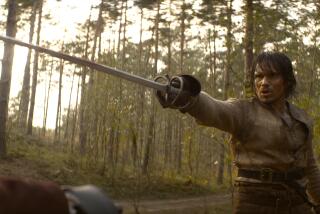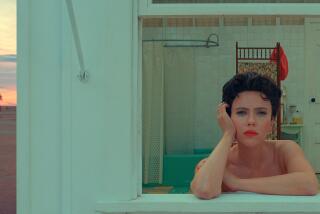MOVIE REVIEW : A Restored ‘Proud Ones’
- Share via
The restoration and revival of Yves Allegret’s 1953 “The Proud Ones” (at the NuWilshire for one week) is yet another of Martin Scorsese’s admirable preservation efforts. As Scorsese himself has pointed out, the film is in the French tradition of the “cinema of quality” against which the New Wave so successfully rebelled at the end of the ‘50s. Yet the film’s fabled writing team, Jean Aurenche and Pierre Bost, in this instance adapting a Jean-Paul Sartre novel, enjoyed a major comeback in old age, thanks to director Bertrand Tavernier’s “The Clockmaker of St. Paul.”
While it is true that “The Proud Ones” has been written with the great care and polish the Nouvelle Vague found artificial, and has been beautifully shot by cinematographer Alex Phillips, a legend of the Mexican cinema, it plunges us into an impoverished, isolated world depicted with gritty realism. A vacationing couple, a Frenchwoman (Michele Morgan) and her ex-GI husband (Andre Toffel), are forced to stop over at a primitive coastal town in Vera Cruz when the husband becomes quickly and seriously ill. What seems a severe case of the turistas turns out to be spinal meningitis; in very short order the local doctor (Carlos Lopez Moctezuma) has on his hands a fast-spreading and lethal epidemic that calls for an immediate quarantine.
“The Proud Ones” is deliberately leisurely in establishing Morgan’s predicament--so much so that in its first half it seems to be proceeding in real time. We all but soak up the heat and are driven nearly nuts from the noise of a fiesta, just as Morgan is, as she’s adjusting to the sudden loss of her husband--and the theft of all her funds as well--while holed up in a a seedy hotel room above a cantina. What director Allegret and Morgan show us so very persuasively is a strong woman marshaling her resources in a crisis while finding it difficult to ignore the seductive torpor of the backwash village. All this attention on the part of the filmmakers to mood and detail is essential to making credible Morgan’s attraction to an alcoholic Frenchman (Gerard Philipe), a onetime doctor who has been drowning his guilt and sorrow in drink for five years because he blames himself for his wife’s death in childbirth.
If on one level, “The Proud Ones” is breathtakingly, unabashedly romantic, on another it is a dry, exceedingly subtle commentary on a culture clash.
One of the enduring legends of the French cinema, Morgan has always had it all: great beauty, genuine talent and intelligence and, most important, dazzling star presence. Slight and sensitive, Philipe, who died of cancer at 37 in 1959, was in the French cinema the romantic idol of his generation. They were a memorable team in this and other pictures, and
“The Proud Ones” (Times-rated Mature for adult themes) is one of the finest films of both their careers.
‘The Proud Ones’
Michele Morgan: Nelly
Gerard Philipe: Georges
Victor Manuel Mendoza: Don Rodrigo
Michelle Cordoue: Anna
Carlos Lopez Moctezuma: The Doctor
Martin Scorsese presents an Interama release of a Columbia production. Director Yves Allegret. Screenplay Jean Aurenche, Pierre Bost; dialogue by Aurenche; based on a novel by Jean-Paul Sartre. Cinematographer Alex Phillips. Music Paul Misraki. Running time: 1 hour, 42 minutes. In French and Spanish, with English subtitles.
Times-rated Mature (adult themes).
More to Read
Only good movies
Get the Indie Focus newsletter, Mark Olsen's weekly guide to the world of cinema.
You may occasionally receive promotional content from the Los Angeles Times.










